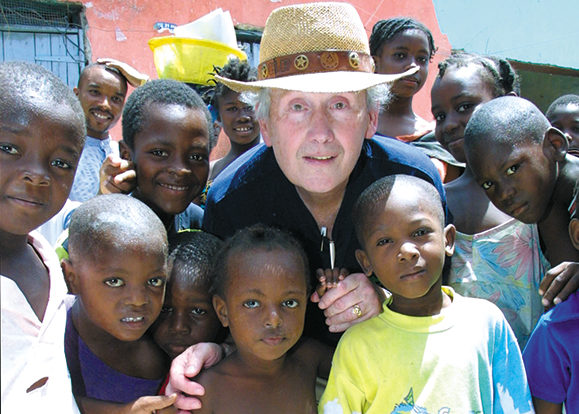Frank McCourt’s life-altering trip to Haiti with Concern Worldwide.
“Beyond the powers of description” are not the words you would expect to come out of a Pulitzer Prize-winning writer, especially when the words are in regards to poverty and they are coming from the mouth of Angela’s Ashes author, Frank McCourt. The man who moved millions with his memoir of an impoverished childhood in Limerick, had his own heart moved on a recent trip to Haiti with the disaster relief agency, Concern Worldwide.
Accompanied by Siobhán Walsh of Concern USA in New York and photographer Liam Burke, McCourt went to the nation that shares an island with the Dominican Republic to promote the organization’s mission in Haiti, particularly their literacy efforts. In Haiti, which has an adult literacy rate of 48 percent, McCourt was “just a white man…introduced as a teacher and writer,” and was able to spend his five days there unrecognized, five days that he said were for him, “a life-altering experience.”
McCourt said of the conditions in which people live and children play, “They are a horror. Just a horror.” While in the St. Martin slums of Port-a-Prince, he saw latrines built by Concern and then walked to the old, unimproved latrines, which he recounted, “were unbearable in the height of the heat with all the filth.” He also visited a dental clinic where the equipment was so outdated “It looked like something from 1919, something that they must’ve used on Al Capone’s teeth.” Tools are not sterilized and, of course, there is no anesthesia.
McCourt was told to “keep [his] mouth shut” in the shower so as not to contract one of many rampant gastrointestinal diseases, something he joked, “is not easy for an Irishman!”
But McCourt is stern when he talks about the lack of aid and attention given to Haiti by U.S. politicians, even in New York where there is a large Haitian community. “Here we have the poorest nation in the Western Hemisphere on the doorstep of the United States, and Cuba sends medical assistance! Why the U.S. won’t help is beyond my comprehension.”
There is another factor to complicate the situation. President Jean-Bertrand Aristide’s opponents make it extremely difficult to get supplies to those who need it the most, and gangs confiscate whatever they can while wreaking terrible violence on the people.
While McCourt believes that President Aristide “is doing his best,” the government is very troubled. “Troubled is not even the word,” says McCourt, “We’re dealing with a collapsed society.”
Concern, an international organization that began as Ireland’s response to the Biafra famine in 1968, has been active in Haiti since the 1995 disaster of Hurricane George. Through urban renewal initiatives, water, health and even micro-finance projects they have reached out in some of Haiti’s poorest regions. When asked how Concern manages to operate in such difficult circumstances, McCourt explained that “It’s not that kind of organization that just goes in and dumps bags of rice all over the place. And they’re not the Great White Colonialists coming in; they don’t tell them what to do. They go in and work with the people.”
For example, Concern staff and community residents determined health care as a priority. Concern will work in conjunction with the local health center by providing additional training and sufficient stores of supplies. They will also set up a rubbish management committee to strengthen the existing rubbish disposal system.
Concern has the same strategy in mind for education, an issue that ranks high with McCourt. Improved literacy rates will lead to improved health, as more people are able to read about proper hygienic and sanitation practices. With a devastating AIDS epidemic coursing through the veins of the island, the ability to read information on prevention is vital. Necessary in combating disease, literacy is also key to breaking the cycle of poverty. It is Concern’s goal that children all over the world will have access to primary education.
Asked if he feels his trip will get Haiti some of the publicity it so desperately needs, McCourt responded, “Who knows what it will accomplish.” But his stay in Haiti has accomplished changing something in McCourt. So profoundly affected was he, McCourt hopes to return next year after the completion of his new book.
A world traveler, McCourt has also been to the poverty-stricken city of Bombay, which, he says, while poor, isn’t nearly as bad as Haiti because there is still industry there. But he does not believe that Haiti is without hope: “When we were in the mountains of Seau D’eau, the whole village came together, singing, carrying cement and building…The hope in Haiti is the people.” ♦


Leave a Reply